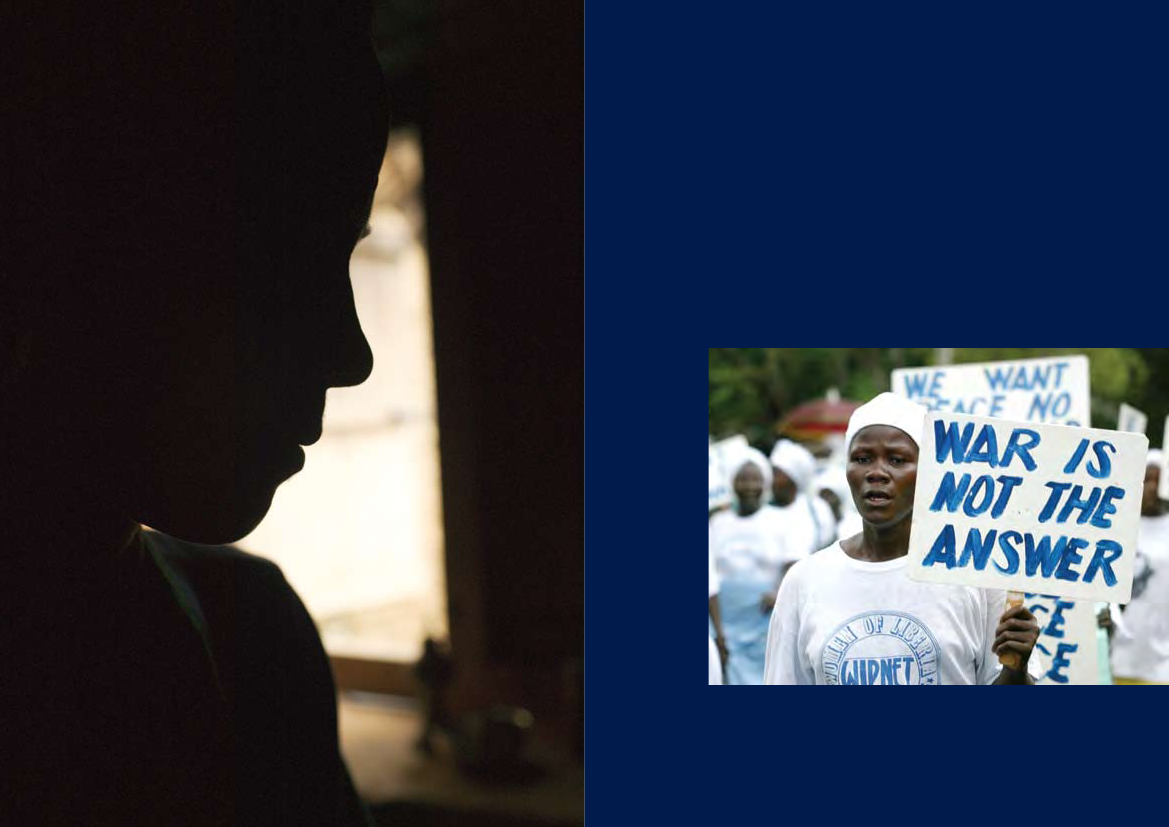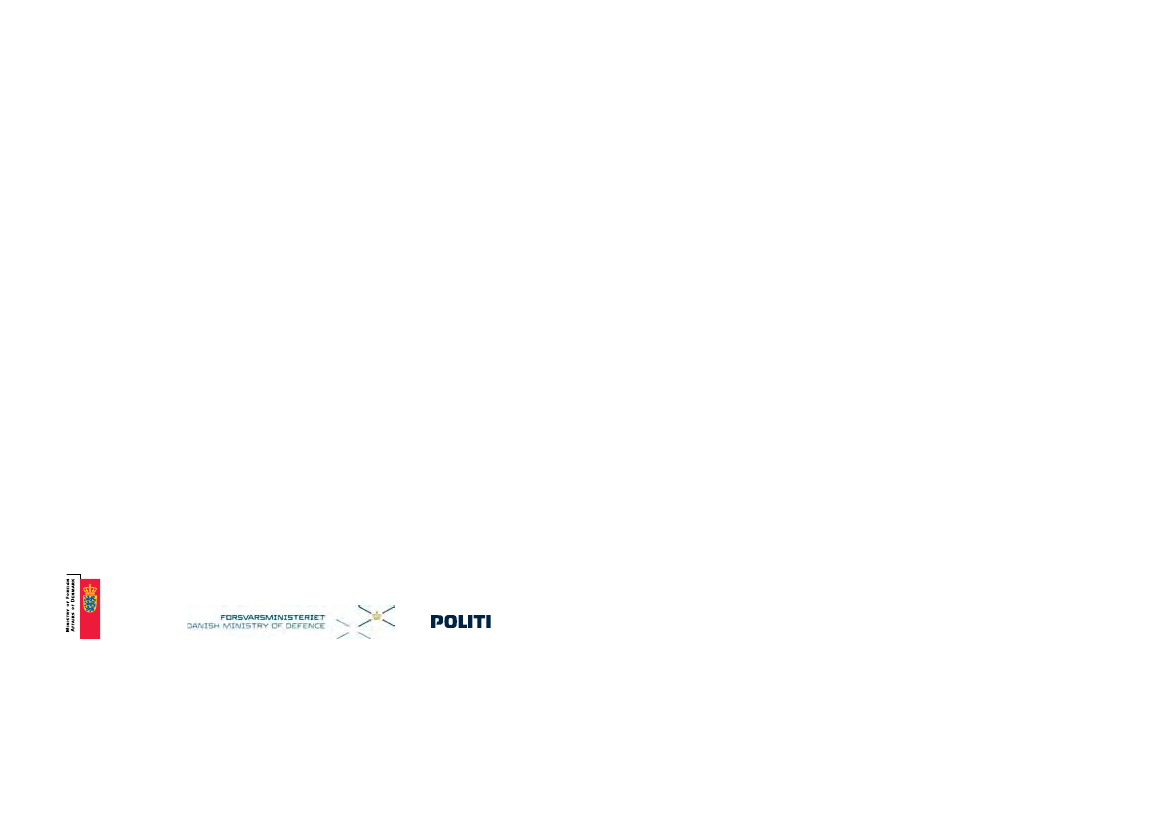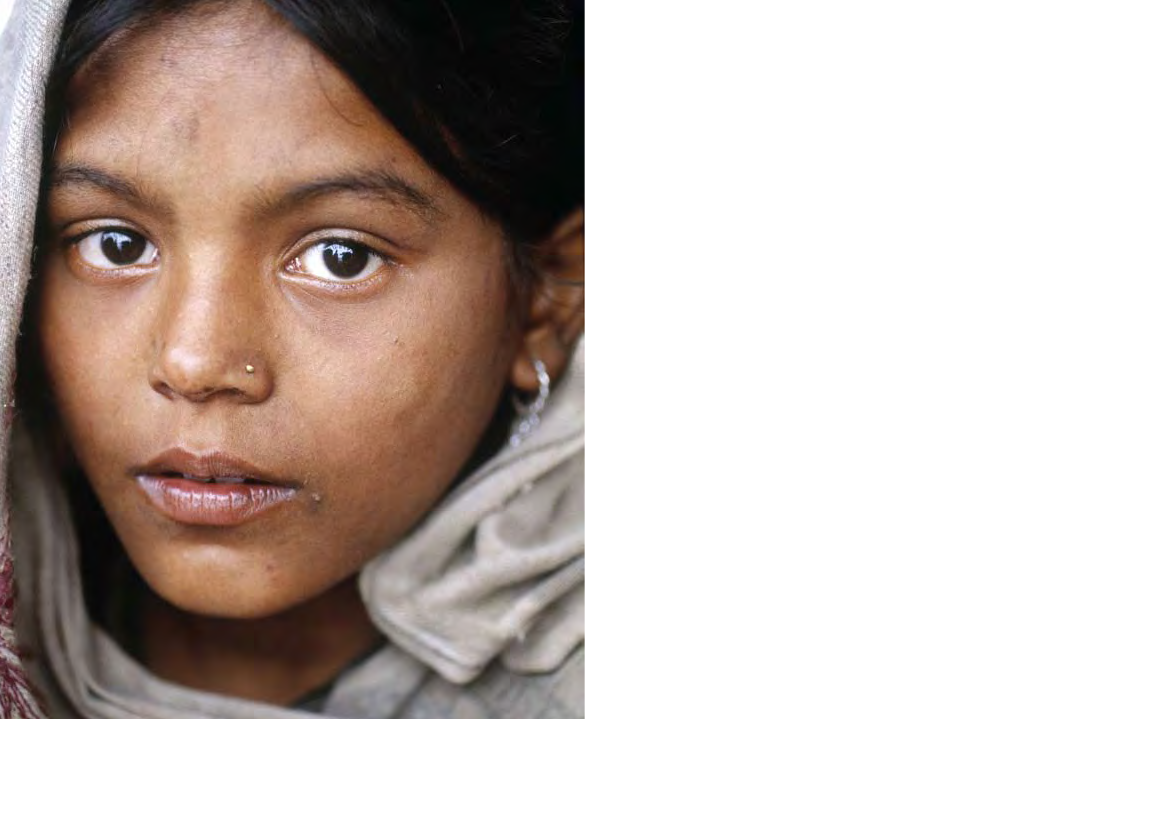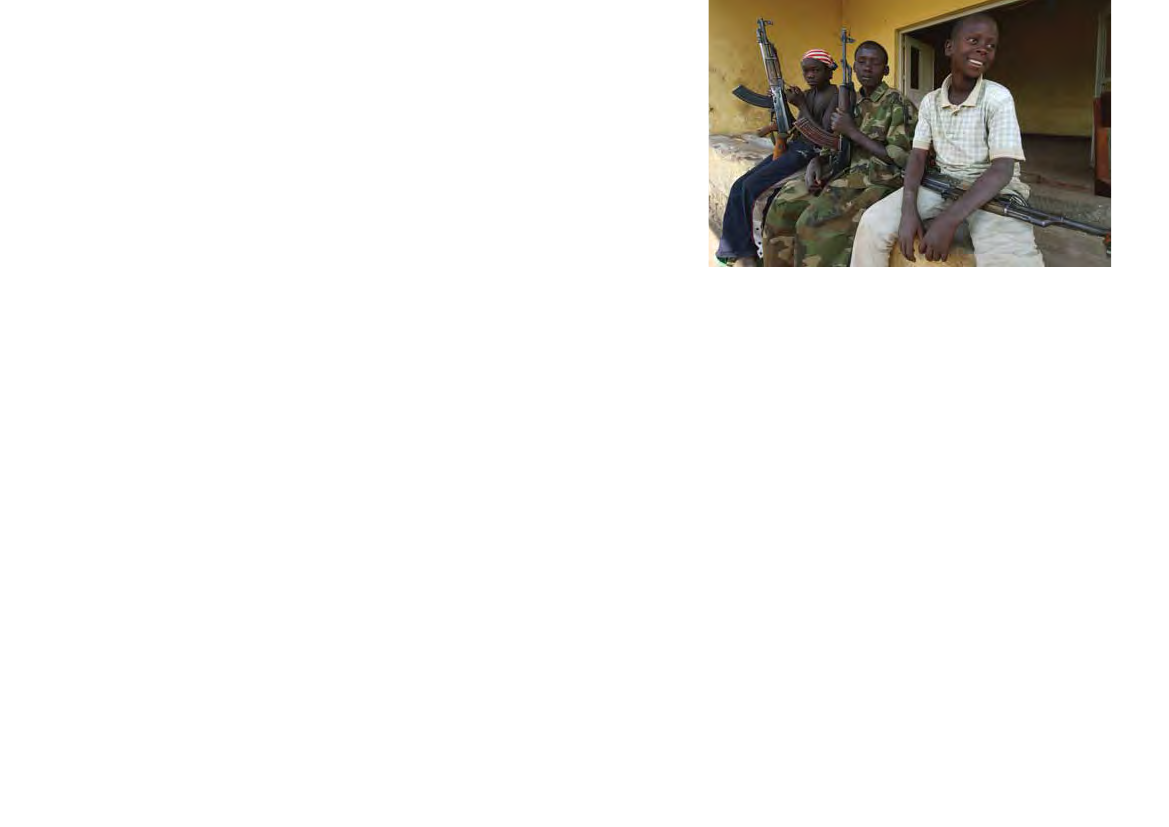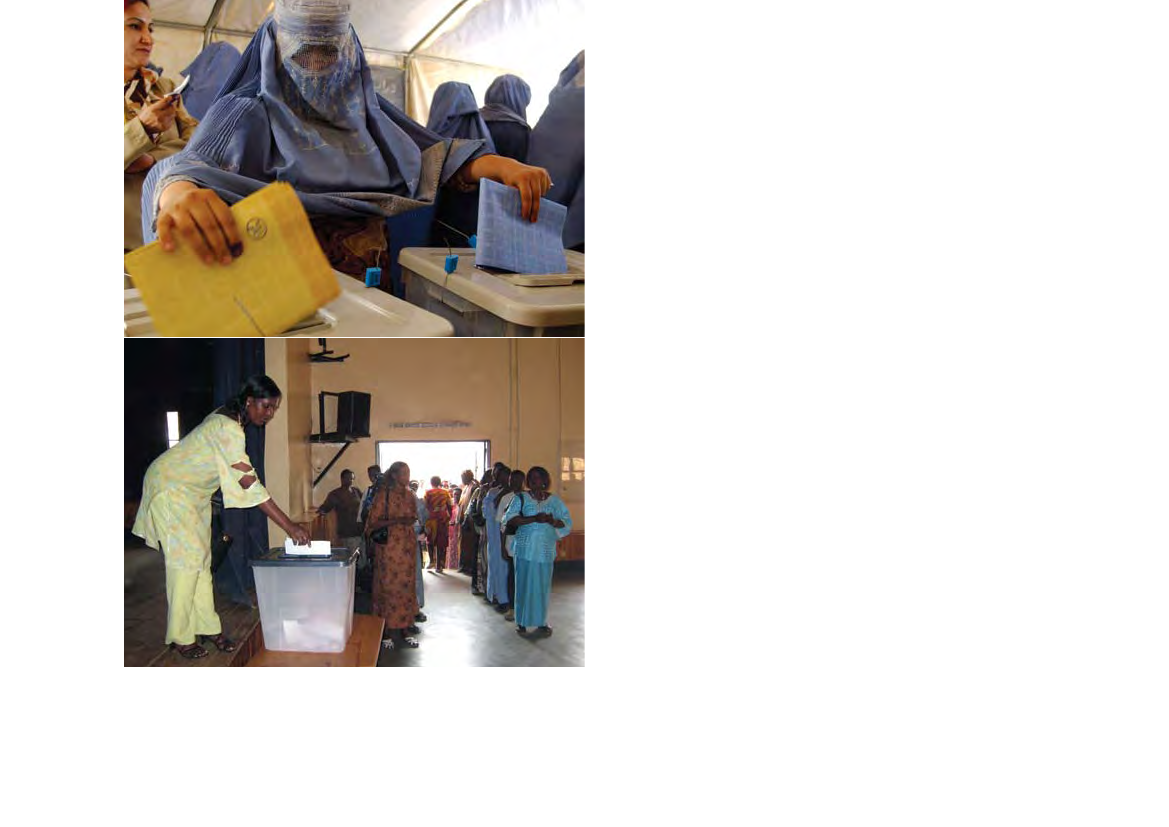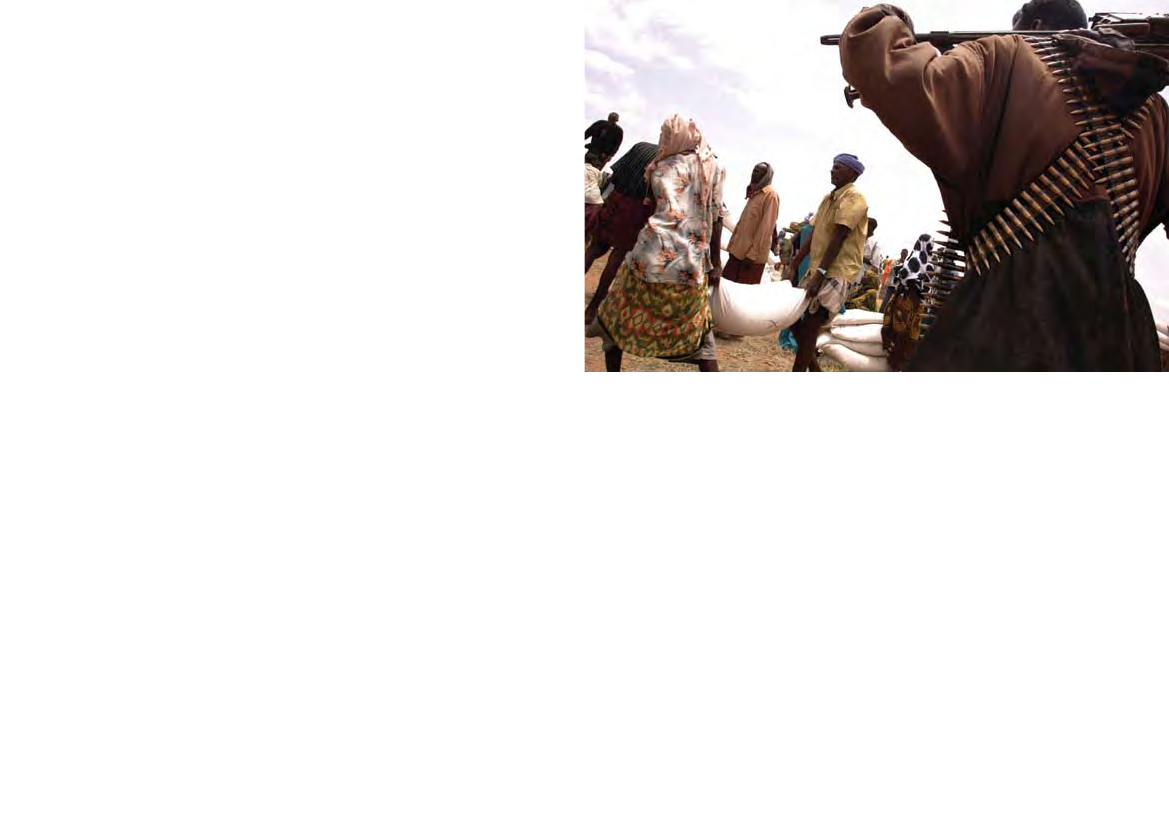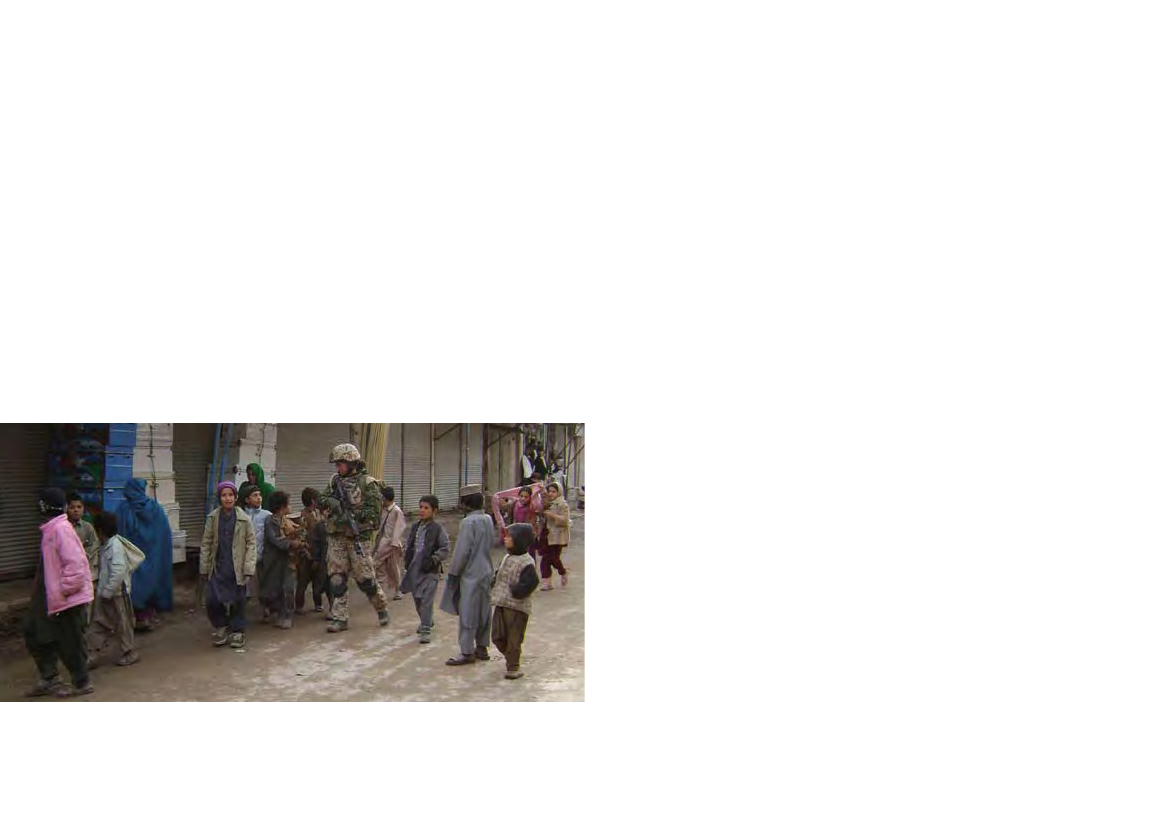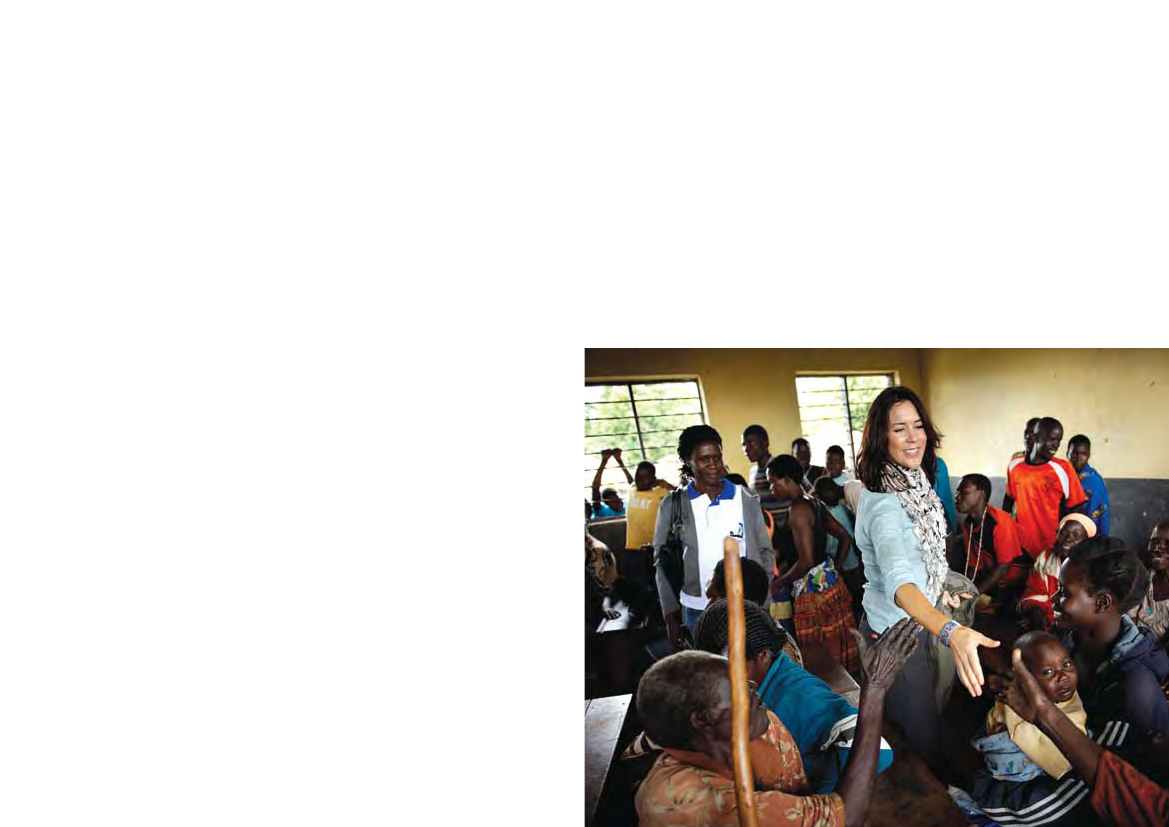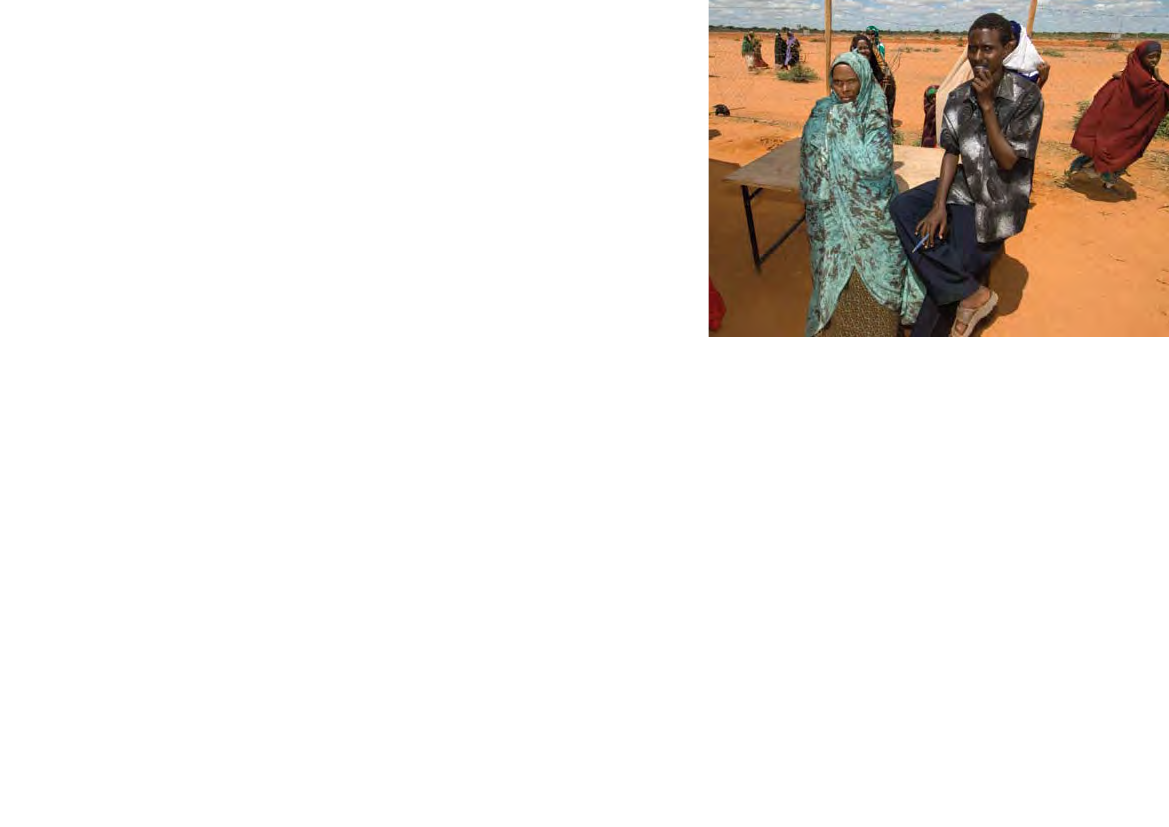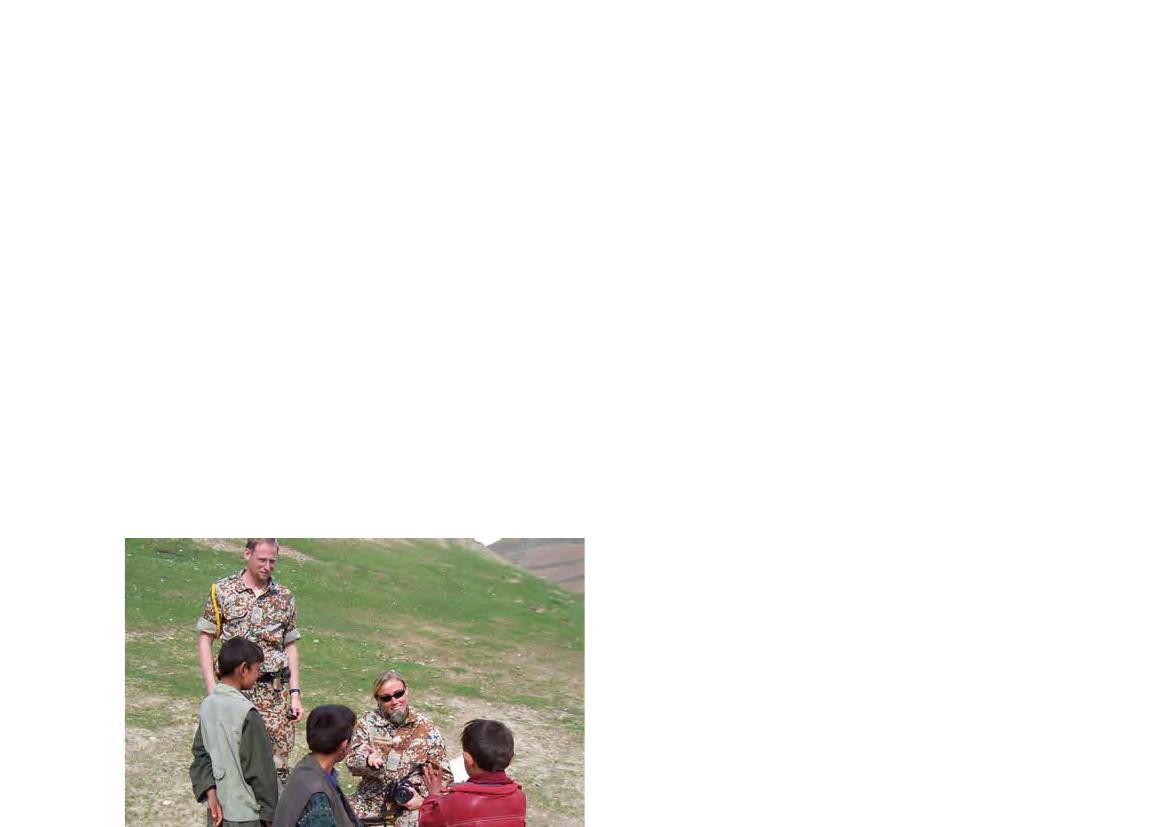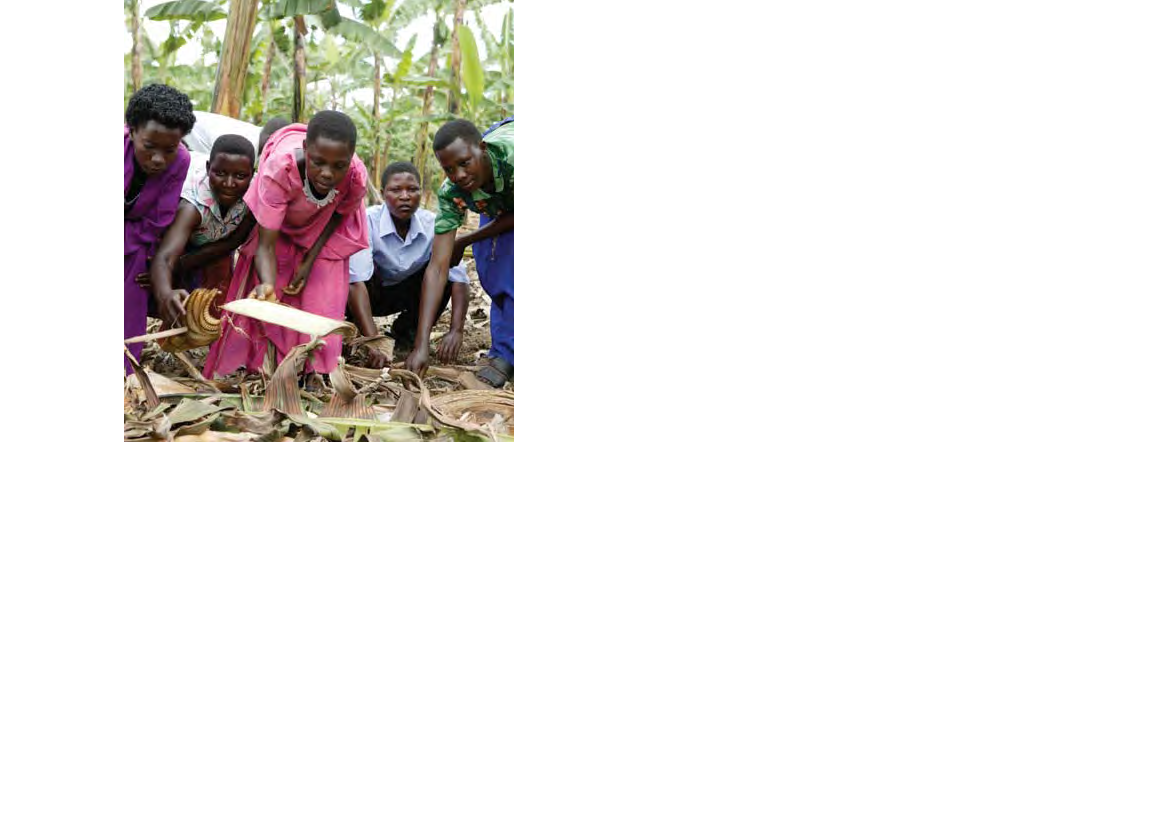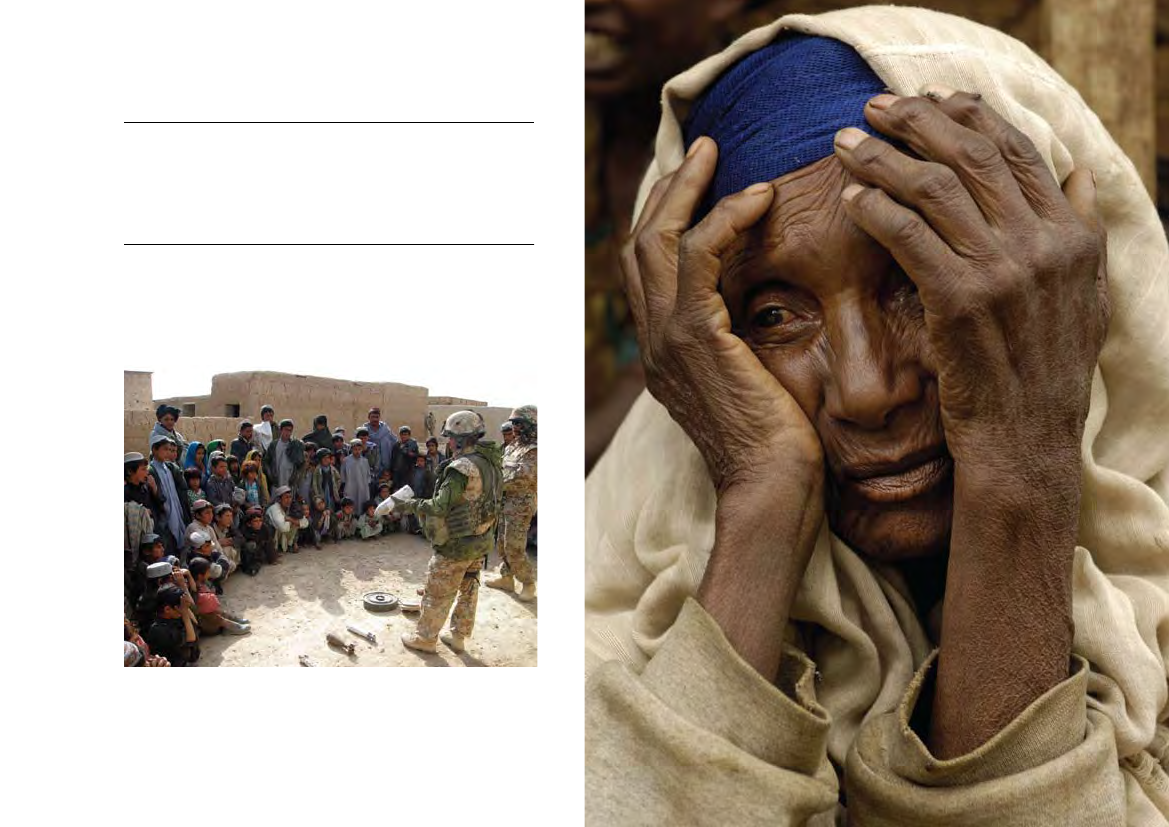Udenrigsudvalget 2010-11 (1. samling)
URU Alm.del Bilag 173
Offentligt
Denmark’s National Action Planfor implementation ofUN Security Council Resolution 1325on Women, Peace and Security2008-2013
12638 / designgrafik
Denmark’s National Action Plan for implementation ofUN Security Council Resolution 1325on Women, Peace and Security 2008-2013
�2008, Ministry of Foreign Affairs, Ministry of Defense, Danish National Police
Cover: Front: The Liberian Women Mass Actions for Peace marched through the streets ofMonrovia chanting slogans for peace and peaceful coexistence amongstLiberians in 2003. (Photo: AFP, Scanpix)Back: Women are especially vulnerable during armed conflict but also a resourcefor peacebuilding and reconstruction. (Photo: Mikkel Østergaard)Design: Designgrafik.dkPrint: Ministry of Foreign AaffairsISBNISBN978-87-7087-058-0 (print version)978-87-7087-059-7 (internet version)
Denmark’s National Action Planfor implementation ofUN Security Council Resolution 1325on Women, Peace and Security2008-2013
Ministry of Foreign AffairsAsiatisk Plads 2DK 1448 Copenhagen KDenmarkPhone: + 45 3392 0000E-mail: [email protected]
Ministry of DefenceHolmens Kanal 42DK 1060 Copenhagen KDenmarkPhone: + 45 3392 3320E-mail: [email protected]
Danish National PolicePolititorvet 14DK-1780 Copenhagen VDenmarkPhone: + 45 3314 8888E-mail: [email protected]
lisT of abbreviaTions
Table of conTenTs
AUDDRECOWASESDPEUICRCIGADIHB
African UnionDisarmament, Demobilisation and ReintegrationEconomic Community Of West African StatesEuropean Security and Defence PolicyEuropean UnionInternational Committee of the Red CrossInter Governmental Authority on DevelopmentInternationale Humanitære Beredskab (DanishInternational Humanitarian Services)IMWGInter-Ministerial Working GroupNAPNational Action PlanNATONorth Atlantic Treaty OrganisationNGONon Governmental OrganisationOCHAOffice for the Coordination of Humanitarian AffairsOECD/DACOrganisation for Economic Co-operation andDevelopment/ Development Assistance CommitteeOSCEOrganisation for Security and Co-operation in EuropeSADCSouthern African Development CommunitySCRSecurity Council ResolutionUNUnited NationsUNDPUnited Nations Development ProgrammeUNFPAUnited Nations Population FundUNHCRUnited National High Commissioner for RefugeesUNICEFUnited Nations Children’s FundUNIFEMUnited Nations Development Fund for WomenUNMASUnited Nations Mine Action ServiceUNRWAUnited Nations Relief and Works Agency for PalestineRefugees in the Near EastWBWorld BankWFPWorld Food Programme
List of abbreviations1. Introduction2. Policy Context, Challenges and ObjectivesAchievements and Lessons Learned 2005-20073. Humanitarian and Peace OperationsNational MeasuresEuropean MeasuresGlobal Measures4. Peace Building and Conflict PreventionBilateral Cooperation, Disarmament, Demobilisationand Reintegration and Regional IssuesThe Role of Danish NGOsMultilateral Cooperation5. Knowledge Management and Learning6. Implementation, Monitoring and RevisionQuick list of actions related to institutions
258101313182023232828313336
2
3
1. inTroducTion
BackgroundOn 31 October 2000 the United Nations Security Council unanimouslyadopted Security Council Resolution 1325 (SCR 1325) on Women andPeace and Security. The objectives of the resolution are to protect women’srights during armed conflicts, prevent impunity for gender based crimes,mainstream gender aspects in peacekeeping operations and increasewomen’s participation in the various phases before, during and afterarmed conflicts.SCR 1325 puts forward concrete recommendations to the UN memberstates, entities of the UN System, civil society and other actors involvedin international peacekeeping and development cooperation. Theresolution is considered to be a milestone in the Security Council’s workwith women, peace and security. Yet, the impact of the resolutiondepends entirely on the political will of the various actors to bring intooperation, implement and monitor the recommendations and objectivesset out in the resolution.The Secretary-General’s report of October 2004 on Women and Peace andSecurity concluded that despite significant efforts there were still manygaps and challenges with respect to the implementation of SCR 1325.Consequently he called on the Security Council, Member States, UnitedNations entities and civil society organizations to reaffirm their commit-ment and strengthen efforts to fully implement SCR 1325. In June 2005,Denmark adopted its first National Action Plan (NAP) on SCR 1325.photo: mikkel østergaard
Young girls in Nepal join groups to learn about women’s rights.
From the outset of the formulation of the first plan, a revision processwas slated to start in 2007. That decision stemmed from the recognitionof the need to strengthen the response further, by including a moresystematic approach to incorporate gender issues in all development andhumanitarian activities related to armed conflicts. Moreover the newNAP would also augment the role of the Danish Armed Forces, theDanish National Police and civil society in SCR 1325 related actions.5
4
Structure of the National Action Plan (2008-2013)This NAP on SCR 1325 on Women, Peace and Security articulates a seriesof actions to fulfil Denmark’s renewed commitment to the resolution forthe period 2008-2013. The Ministry of Foreign Affairs, the Ministry ofDefence and the Danish National Police, as a representative of the Ministryof Justice, coordinate and guide the implementation of the National ActionPlan by means of an Inter-Ministerial Working Group (IMWG). DanishNGOs are also engaged in SCR 1325 related actions. This plan has athematic structure. Following this introduction, a summary of the mainachievements of the first NAP (2005) is included in order to acknow-ledge its accomplishments and its value for the formulation and thecontents of the present NAP.The overall policy context, the challenges and the objectives for Denmark’sengagement sets the overall parameters of the plan, which is structuredaround two overall themes:1) Humanitarian and Peace Operations,and2)Peace Building and Conflict Prevention.These themes contain the operation-alisation of the overall objectives and reflect the existing fields of practiceand added value of Danish state and civil society actors and actions.Examples are Danish organisational and operational experience in civil-mil-itary co-planning, and, within NATO, Denmark’s focus on concertedplanning and action of civil-military activities (Comprehensive Approach).In practice humanitarian and peace operations and peace building andconflict prevention responses are inter-linked and it is often difficult todraw a clear distinction between the two themes in real life situations.Nevertheless the distinction is useful in the conceptual groupings ofactions.TheHumanitarian and Peace Operationschapter (chapter 3) is subdividedintonational,both government and NGO actions,Europeanandglobalmeasures.ThePeace Building and Conflict Preventionchapter (chapter 4), is dividedinto three sub-sections: the first sub-section lists the actions relevant tobilateralandregionalcooperation, the second sub-section includeshumanitarian and NGO assistanceand the third is onmultilateralengagement.6
photos: afp/scanpix
Former child soldiers, mostly young boys, constitute a special problemin post-conflict reconstruction.
Following the main themes, chapter 5 focuses on those actions needed toaugment knowledge management and institutional learning. This alsoincludes actions relevant to research activities that can further advance thenational action plan.The NAP includes indicators to measure achievements and a monitoringmechanism for results-based reporting on implementation. Monitoring andevaluation accordingly comprise the closing chapter (chapter 6) identifyingthe appropriate actions necessary to fulfil overall implementation andmonitoring of the action plan, as well as the call for a review in 2011. Thischapter also presents recommended actions that can be taken by the IMWGas well as the NGO network.The actions of the NAP are listed as bullet points throughout the docu-ment. The main themes and clusters of actions are accompanied by briefintroductions, which serve to put the actions in context. The responsibleinstitutional actors are named in each action.A distinction of ‘level’ ofnational, EU/regional and internationalarenas foraction is used, emphasising the respective settings in which Danish actorscan implement various aspects of the action plan. In chapter 4,PeaceBuilding and Conflict Prevention,the term regional refers to actions, whichtarget a conflict or post-conflict situation that involves several countries.7
2. Policy conTexT, challengesand objecTivesNational Policy Context and PrioritiesGender equality is a priority for the Government of Denmark, both athome and abroad and its corresponding vision is to create equal opportu-nities for all women and men. The goal is for women and men to beconsidered equal and be granted the same rights and opportunities. Inthis the Government aims to ensure that diversity and individual freedomare respected.Internationally, Denmark’s policy is to contribute to internationalsecurity responses to violent conflicts and subsequently, to take part inaddressing the humanitarian and governance crises that these cause. Thisis rooted within a view to provide protection, while promoting humanrights of women, men, boys and girls.National ownership, partnership with national authorities, and democ-racy are expressed through the equal participation of men and women, aswell as in the participatory and rights based approaches integrated intoDanish development assistance. In conflicts and recovery from conflicts,these values find expression in promoting and safeguarding the right ofwomen to participate in shaping actions towards equitable peace.Leadership by women alongside men is needed to achieve sustainablepeace. Moreover, lasting peace and security demand that internationalhuman rights protection is embedded in international efforts towards theconsolidation of democratic and stable governance in countries emergingfrom conflict. In this context the issues dealt with in SCR 1325 are at thecore of ensuring security. Achieving stable and lasting peace requires thatthese issues be addressed. Consequently the mandates in SCR 1325 arenaturally dealt with within the framework of a comprehensive approachto conflict resolution. These priorities find expression in Denmark’sforeign, development, and security policies, which in turn form the basisand background for Denmark’s support and response to SCR 1325 onwomen, peace and security.8
ChallengesEnsuring gender equality in Denmark’s conflict responses requires thefull realisation of SCR 1325 as a women-specific international instru-ment that focuses on three challenges of how, in the context of violentconflict, gender inequality affects women differently than men. Thesechallenges comprise the following:• The disproportionate vulnerability of women and girls compared to men, during violent conflict and post-conflict situations;• The use of often systematic gender based violence as a strategy of war and impunity of the perpetrators and absence of gender justice;• A limited international and local focus on the protection of women (as victims)and the subsequentlesser focus on their right to participateand their potential resources.This leads tomarginalisationin all phasesof the transition from war to the reestablishment of peace.With those challenges in mind the objectives of Denmark’s engagementare formulated.ObjectivesThe NAP focuses Denmark’s priorities and actions through threeobjectives, which together aim at improving both domestic and interna-tional capabilities in regards to women, peace and security. These havebeen formulated as follows:1. Achieving greater, active participation of women in peace building atinternational and local levels;2. Enhancing the recognition of the special needs and rights of womenand girls before, during and after armed conflict;3. Providing protection of girls and women against violence, includinggender-based violence, such as rape and sexual abuse, and endingimpunity for gender crimes.These objectives are operationalised in the actions listed in the thematicchapters. The indicators relating to the objectives will be monitoredthrough the regular meetings of the IMWG.9
Achievements and Lessons Learned 2005-2007denmark published a national action Plan on scr 1325 in 2005. The objective wasto strengthen and systematize political and operational activities by engaging andcombining foreign, defence and development cooperation activities in the danishcontribution to the implementation of scr 1325. The Ministry of foreign affairs andthe Ministry of defence prepared the plan with both national and internationalfocus areas. at the national level, naP (2005) defined objectives within the danishdefence system and the danish armed forces. at the international level, the planstated that denmark would strengthen the implementation of the resolution in theun, eu, naTo and osce in the field of crisis management, development andhumanitarian assistance.experience in the course of the naP (2005) has been gained both through thecivil-military co-planning initiative and through multilateral and bilateral engage-ments. The Ministry of defence set out to review their current systems following thelaunch of the first naP and came up with proposed actions that would furtherincrease the gender balance in the danish armed forces and more specifically whenthese are engaged in international operations.denmark’s engagement as member of the security council in 2005 and 2006 standsout in the implementation of scr 1325. scr 1325 was one of several ‘thematicresolutions’ in a cluster of inter-connected resolutions on human rights, conflictmanagement and conflict prevention; where other resolutions focused on civiliansand children. Taken together, these themes defined a significant part of denmark’sfocus on human rights and conflict responses during its security council membership.Within the un, denmark was also actively engaged in the setting up of the unPeace building commission. in january 2006, denmark was elected to one of thesecurity council’s seven seats in this commission. in the security council, denmarkin cooperation with like-minded member states, worked for the incorporation ofaspects of scr 1325 into all relevant resolutions and Presidential statements.as an example of bilateral activity, scr 1325 was given priority in the cooperationwith regional organizations in africa (ecoWas, au, sadc) although it was acknowl-edged that these organisations, with the exception of sadc, were weak in the areaof gender equality. The international ngo ‘international alert’ worked in liberia,sierra leone and guinea to promote women’s priorities for peace building includingscr 1325 implementation with danish support.
The eu has accelerated actions to institutionalise and operationalise scr 1325.denmark has been active in this context especially regarding incorporation ofgender related issues into the planning of eu missions and in the mandates of euspecial representatives.civil-military co-planning became a focus area for danish actions and within naTodenmark has a strong focus on concerted planning and action of civil-military activi-ties (comprehensive approach), which has been further conceptualised within theorganisation. an increased focus on gender issues and women specific actions wasrecognised as an area to have increased attention and visibility, and initial stepswere taken towards naTo’s implementation of scr 1325, also in military opera-tions.as examples of international awareness raising and creation of debate, a study onthe state of unscr 1325 related topics in the great lakes region in africa wascommissioned to the international crisis group, and in 2007 denmark held aninternational seminar on Protection of civilians – learning from darfur. The seminarhad a broad participation by un, eu, humanitarian organisations, researchinstitutions and think tanks.in the osce denmark has pursued an agenda setting role and has been activelyengaged in several initiatives regarding scr 1325. a Ministerial council decision onscr 1325 and inclusion of the resolution in a number of special working sessionshave been among actions supported by denmark.The naP (2005) was not monitored comprehensively. Many activities were carriedout and evidence suggests that these included valuable contributions, but theresults of the initiatives were not followed in a concerted manner. one importantlesson is therefore that a systematic monitoring through an inter-ministry workinggroup would have been valuable for required adjustments and the formulation ofthe next generation naP.Moreover, the plan focused mainly on the protection of women from the effects ofviolent conflict, while less attention was given to aspects of women’s activeparticipation in conflict solution and peace building. a third lesson applied in therevised naP is that deliberate and sustained attention is required to ensure that thetotality of denmark’s actions on scr 1325 reflects a balanced approach betweenprotection of women and girls, and promoting the right of women to participate inpeace and security work.
10
11
3. huManiTarian andPeace oPeraTionsHumanitarian assistance and peace operations call upon the establish-ment of critical linkages between various partners. In this respect anoverarching aim of Danish support to peace operations is to worktowards supporting the return of a secure environment with rule of lawin regions of conflict and post-conflict. In such situations gender basedviolence remains a critical dimension. Consequently, immediate protec-tion should be aimed for in all actions of support to enable the reductionof gender based violence and abuse. Protection of civilians is also a highpriority in Danish humanitarian assistance. When relief efforts are beingplanned, emphasis is placed on the special needs of vulnerable groups,including women. Examples of the important dimensions of the specialneeds of women and girls are the physical disabilities caused for exampleby land mines, as well as congenital disabilities, which leave deeppsychological scares. Although already recognised in Danish supportedactions, there is a need for increased attention. Victimisation and a senseof helplessness unfortunately are inevitable consequences of a failure toprotect women in conflict. However, providing protection need not be amatter of passive reception of outside assistance. Denmark promotesexisting and innovative humanitarian and peace support practices thatalso in the early stages of support encourage the participation of womenin conflict solution and peace building.The issue of sexual exploitation and abuse by peacekeeping forces andother staff members from the United Nations is unacceptable by all legal,moral and ethical standards, it undermines the reputation of the UnitedNations, and it has devastating consequences for the victims. Denmark’sinterventions to address this issue include domestic and UN level actionsand are based upon zero tolerance.National Measures
Denmark has been working specifically with civil-military co-planningfor many years and this section on national measures initially lists13
photos: afp/scanpix
Afghan woman using her right to vote (top).A Rwandan woman casting her vote in the September 2008 elections.Women play a key role in the reconstruction of the country after the genocide of 1994.
12
operationally based actions. This is followed by actions, which morespecifically deal with internal development among the Danish actors andDanish lobbying for staffing, recruitment related issues relevant forhumanitarian and peace operations viewed through a SCR 1325 lens.Finally, civil society actions are included.Civil-Military Co-PlanningDenmark has been at the forefront of developing the concept andapproaches to civil-military co-planning. Civil-military co-planningpursues civilian objectives and has emerged to effectively strengthencooperation between military and civilian efforts in conflict areas, so as toincrease overall effectiveness of operations with the aim of creatingsecurity, reconstruction and development. The purpose of civil-militaryco-planning is to bridge security and development by laying the founda-tion for the longer-term development assistance. In areas where thesecurity situation does not permit civilian actors to operate alone, themilitary comes in to assist with reconstruction and the initial develop-ment in collaboration with the civilian advisors. The support of themilitary is hence a last resort. One of the main tasks of the military is toprovide protection of civilian advisors, logistical support and assistancewith project identification, contracting of local partners and monitoringof implementation. Within the field of civil-military co-planningDenmark will focus on the following:• The Ministry of Foreign Affairs and the Ministry of Defence will continuously assess the civil-military co-planning initiative in order toinclude relevant elements of SCR 1325 in humanitarian and recon-struction initiatives;• The Ministry of Foreign Affairs and the Ministry of Defence will, in concerted efforts on national political decisions on internationaloperations, work for the inclusion of SCR 1325 elements in UN andNATO decisions, so that subsequently the national decision makingdocuments will include SCR 1325 elements;• Denmark’s defence institutions will continue to systemize and further develop the recommendations on inclusion of SCR 1325 in relevantmanagement documents started under the auspices of the NAP(2005) and thereby also build on the key recommendations of the14
major research study undertaken by the Ministry of Defence (2007).These are:(i) The Ministry of Defence will oversee that the collection andanalysis of SCR 1325 specific information is enhanced in militaryplanning processes. Military intelligence services will, withunderstanding of how SCR 1325 influence Danish militaryengagements in international operations, be able to includeadjustments in information collection;(ii) The Defence Command Denmark will develop a policy for SCR1325 in international operations with Danish participationincluding an assessment of where and how a women, peace andsecurity perspective can be enhanced in management documents;(iii) The Danish Armed Forces will work towards the aim that Danishcontingents, to the extent possible, be composed with considera-tion to SCR 1325 perspectives.Danish Humanitarian AssistanceDanish humanitarian assistance is channelled through the humanitarianUN organisations, international organisations, and Danish relief organi-sations. The UN organisations have a central position in Danish humani-tarian assistance due to their global mandates and the special degree oflegitimacy and authority thus associated with their activities.• It is important to mainstream gender including SCR 1325 perspec-tives at the overall coordinating level of humanitarian action. TheMinistry of Foreign Affairs will promote the inclusion of SCR 1325within three core areas of OCHA’s work: the coordination of emer-gency humanitarian response, the development of humanitarianpolicy, and advocacy for humanitarian issues;• In its wider policy dialogue with humanitarian UN organisations such as WFP, UNHCR, UNICEF and UNRWA, as well as theICRC, Denmark will actively work for wider incorporation of thevarious aspects of SCR 1325, including the important aspect ofcombating gender based violence through their humanitarianactivities. Through the cooperation with Danish relief organisations,such as Danish Refugee Council and Danish Red Cross, importance15
photo: afp/scanpix
will be placed on the inclusion of SCR 1325 aspects in humanitarianprojects and programmes supported by the Ministry of ForeignAffairs;• An analysis will be conducted of the profile of the existing roster of experts registered in the Danish Humanitarian Services in theMinistry of Foreign Affairs with a view to, where relevant, (i) increasethe number of women in the Danish Humanitarian Services (IHB)roster and (ii) aim to increase the number of persons with skill setsrelevant to the implementation of SCR 1325 mandates.Representation, Participation and Recruitment• Denmark will contribute to increasing the number of women in senior international peace work by contributing female candidates tothe roster for senior and executive positions related to women, peaceand security work within the EU and United Nations;• The Danish Armed Forces and the Danish National Police will aim to achieve a certain gender balance in personnel available at all times toparticipate in peace operations;• The Danish National Police will, in collaboration with the Ministry of Foreign Affairs, lobby for improved Conditions of Service forpolicewomen participating in EU missions, including procedures fordeployment with a view to have the EU adopt more flexible rules;• The Danish National Police will develop an internal action plan for the implementation of SCR 1325. This is based on a new staff policyadopted in 2007 that includes perspectives of SCR 1325 in relationto international missions;• Danish International Humanitarian Services will aim to increase the number of women recruited for the service, and achieve a certaingender balance in personnel available at all times to participate inpeace operations.Human Resource Development• The Danish Armed Forces and the Danish National Police will enhance staff competence and understanding in internationaloperations of local cultural conditions, as well as the social and16
Various aspects of SCR 1325 are included in the humanitarian activities of organisa-tions such as World Food Programme.
economic effects of conflict and post-conflict situations, that affectwomen and girls’ vulnerability and hence need for protection. For theDanish Armed Forces this will be achieved through training providedby the Royal Danish Defence College and for the Danish NationalPolice through the National Commissioner, Police Academy;• The Danish Armed Forces and the Danish National Police will enhance the core capabilities on women, peace and security, throughintegrating SCR 1325 in gender education and training and innational decision making documents responding to UN, NATO andEU mandates;• The Danish National Police will explore opportunities for participa-tion of Danish National Police personnel in relevant EU courses ongender and women’s issues;• The Danish International Humanitarian Services will through training enhance staff competence and understanding of SCR 1325,both with regard to women and girls’ protection and participation inconflict and post conflict situations.17
Role of Civil SocietyCivil society organisations that work in the area of humanitarian andpeace operations can integrate SCR 1325 in gender mainstreaming andin their responses to conflict.• As Danish civil society organisations are important actors in the civil-military co-planning, they will take active part in the coordina-tion of activities. Furthermore, organisations will when deemedrelevant be active in the training of Danish soldiers/police;• In already existing forums for dialogue between the Ministry of Foreign Affairs and the Danish civil society, primarily theHumanitarian Contact Group, gender mainstreaming issues andspecific issues related to SCR 1325 will be discussed when relevant;• The women and conflict initiative in Africa of Ministry of Foreign Affairs provides an opportunity to support Danish, international andAfrican NGOs to engage in SCR 1325 activities such as (i) awarenessraising of SCR 1325 vis-a-vis both national and regional organisa-tions in Africa, (ii) programmes targeting protection and participationof women in conflict solution, peace building and reconstruction.European Measures
Measures in a European context have been divided into three sub-sec-tions. First are actions in relation to the European Union, followed by theOSCE related actions. Actions in relation to like-minded countries listedare listed towards the end of the section.European UnionThe EU only very recently began to integrate gender into the securitydimension, but significant progress has been made. In the period2005-2007 Denmark has been an active player contributing to acceler-ated actions by the European Union that institutionalise and operational-ise SCR 1325. SCR 1325 and gender aspects are now part of the basis foron-going work on security and development and also on fragile states as anew focus area. Denmark will, within the EU and in close alignment18
with like-minded countries, focus on ensuring that the EU delivers onSCR 1325. Denmark will prioritise actions aimed at the effectiveimplementation, and timely review and evaluation of the recentlyadopted EU measures on SCR 1325.• The Ministry of Foreign Affairs will work to ensure that gender aspects and in particular SCR 1325 aspects become part of future EU actionplans and guidelines on security and development and fragile states;• The Ministry of Foreign Affairs will promote and work for EU ‘synchronisation’ with relevant UN initiatives;• The Ministry of Foreign Affairs will work for the promotion of a systematic review and institutional learning within the EU on theimplementation of SCR 1325, as per adopted EU policies andguidelines.• The Ministry of Foreign Affairs and the Danish National Police will support that gender-related issues are addressed in the planning of EUMissions and in the mandates of EU Special Representatives;• The Ministry of Foreign Affairs will work towards increasing the flexibility of EU terms and conditions for deployment, with the viewto attract more (police) women;• The Ministry of Foreign Affairs will contribute to a roster of Danish female candidates at senior level for ESDP activities;• The Danish National Police will aim to educate and train an increas-ing number of police women for deployment in EU missions;• Danish National Police personnel will participate in relevant joint EU training for police and civil servants.The Organization for Security and Co-operation in Europe (OSCE)Denmark has been actively engaged in several initiatives within theOSCE with respect to increasing the focus on SCR 1325 throughout theorganisation. Denmark will continue this work within the framework ofthe revised NAP.• The Ministry of Foreign Affairs will encourage continued implemen-tation of SCR 1325 in the OSCE as outlined in several existingdocuments, i.a. the OSCE Action Plan for Promotion of GenderEquality and the Ministerial Council Decision 14/05 (2005) on19
“Women in Conflict and Crisis Management”. Among others, in theForum for Security Cooperation, implementation of SCR 1325 isenvisaged to be included in the reporting mechanism established inconnection with the Code of Conduct on Politico-Military Aspects ofSecurity (1994)”;• The Ministry of Foreign Affairs will promote that a SCR 1325 perspective be incorporated into OSCE missions.Like-minded Countries InitiativesCurrently, within the European sphere, four EU member countries,namely Denmark, Sweden, Holland and the United Kingdom, and thenon EU member countries, Norway and Switzerland, have formulatednational action plans on SCR 1325. Within the UN, Canada stands outas a kindred country. Lessons learned indicate that further attention andconcerted action among European countries is desirable.• The Ministry of Foreign Affairs will encourage like-minded European countries to promote effective implementation, monitoring andevaluation of EU SCR 1325 measures;• The Ministry of Foreign Affairs will encourage the establishment of regular contacts of like-minded countries to discuss the implementationand monitoring of their respective and emerging national action plans;• The Ministry of Foreign Affairs will promote a partnership of like-minded European countries, similar to the UN ‘Friends of 1325Group,’ to discuss regularly with the expressed intent of promotingand monitoring benchmarks stated in their respective NAPs, as wellas advocate for the overall principles of SCR 1325 in other inter-gov-ernmental bodies. This partnership will serve to organise and gatherformal networks as well as complementary umbrella organisations,through which they will further develop their respective strategies toreach expected outputs within their given time frame.Global Measures
In order to translate SCR 1325 from policy to action, global measures areimportant in that multilateral institutions are instrumental players.20
Danish actions in relation to global measures are divided into actions inrelation to United Nations and in relation to NATO.United Nations• The Ministry of Foreign Affairs will continue to work to promote SCR 1325 within the new structures of the UN and during thereform process. This will include promoting SCR 1325 within thecreation of a gender unit and within the humanitarian reformprocess;• The Ministry of Foreign Affairs and where relevant for specific missions with Danish deployment the Ministry of Defence and theDanish National Police will continue to give attention to SCR 1325perspectives into UN missions, including upholding the zero toler-ance of violations of code of conduct;• The Ministry of Foreign Affairs will – on request – continue to support capacity building and training on the prevention of sexualexploitation and abuse in UN Peacekeeping Operations;• In situations where Denmark provides personnel or financial contri-butions to UN missions, a position as ‘donor of first resort’ for UNagencies will be sought, when it comes to ensuring that SCR 1325‘makes footprints on the ground’;• The Ministry of Foreign Affairs and where relevant for specific missions with Danish deployment the Ministry of Defence and theDanish National Police will work for the strengthening of theimplementation capacities on gender mainstreaming and women,peace and security work of the already existing UN missions to Sudan(UNMIS; Darfur), Afghanistan, Iraq and in the TemporaryInternational Presence of Hebron on the West Bank.NATOSince 2002 the ‘Gender Balance and Diversity for NATO’ policydocument has been the basis for securing more diversity in recruitmentand staffing policies within NATO. Although SCR 1325 is not men-tioned specifically, the organization uses this policy as the means toimplement SCR 1325 internally.21
Denmark’s strategy in NATO, in respect to gender equality within theorganization and gender equality as an outcome of NATO activities inpeace building and reconstruction, reflects a priority of the DanishGovernment on gender issues. Initial steps towards implementation ofSCR 1325 in NATO-led operations have already been taken andDenmark has promoted the initiation of a NATO policy on SCR 1325implementation.• The Ministry of Foreign Affairs and the Ministry of Defence will con-tinue to promote the position that a comprehensive approach addsvalue to the wider international peace-building efforts;• The Ministry of Foreign Affairs will, in this context, work towards ensuring that civil-military considerations become a natural part ofthe set-up, working processes and mind set of the Alliance. This couldcontribute to an effective implementation of SCR 1325;• The Ministry of Foreign Affairs will work to further raise the profile of SCR 1325 in the Alliance and lobby for stock taking that willcover NATO operational experience as well as internal reformprocesses relevant to gender issues.
4. Peace building andconflicT PrevenTionPeace building and conflict prevention envisions bilateral and multilateralstrategies that focus on the prevention of violent conflicts, as well asproviding support to mediation, negotiation and reconciliation, andensuring sustainable and equitable peace outcomes. In responding toconflict, it is during peace building and conflict preventive actions thatthe full and equal participation of women takes centre stage. Moreover,in conjunction with promoting the right to participation of women,peace building often entails supporting women in their political andpractical efforts to transform traditional gender roles where these areoppressive and incompatible with the aim of achieving equitable andsustainable peace.Both at country and regional level in a development context, actionsemphasise the need for raising awareness of SCR 1325 and engagementthrough development assistance programmes. Civil society actors alsomake important contributions. At the multilateral level Denmark willwork towards strengthening the implementation of the resolutionthroughout the UN system, in respect to the situation of women, peaceand security in the context of crisis recovery, and development assistance.Bilateral Cooperation, Disarmament, Demobilisation and
Reintegration and Regional Issues
Bilateral CooperationDenmark’s development priorities address a changing world in a dynamicway; whilst at the same time emphasising that continuity and persever-ance are part of the response to the new challenges. Two years of imple-mentation experience and lessons learned from Denmark’s first NAP havebrought to the forefront how crucial it is to maintain a focus on concreteand do-able actions.
photo: army operational command denmark
Danish women soldiers are actively involved in Denmark’s peace-keeping effortsin Afghanistan.
22
23
Denmark has a mature and long-standing commitment to supportingnational poverty reduction policies and programmes in partner countries.Most of these countries show upward trends in terms of amelioratingpoverty and improving human security and adherence to internationalhuman rights. However, in the context of conflict affected states andfragile situations, among others Uganda, Sudan, Afghanistan and Nepal,conditions prevail that call for prioritisation of Denmark’s commitmentsto SCR 1325.The Ministry of Foreign Affairs has in its Africa focus a special emphasison gender equality and women’s empowerment as well as on support topeace and security programmes.Denmark typically supports a mix of social and productive sectors,governance reform and promotes human rights and gender mainstream-ing as cross-cutting issues. Assistance is increasingly organised along theprinciples of the Paris Declaration on Aid Effectiveness, and seeks topromote ownership, harmonise with other development partners andalign the official development cooperation with government policies andplans.Most conflict affected states are characterised by a high degree of statefragility and the OECD/DAC ‘Principles for Good InternationalEngagement in Fragile States and Situations’ provide a basis for imple-menting the Paris Declaration in these difficult environments.All actions fall under the auspices of the Ministry of Foreign Affairs andwithin this setting the Ministry will:• Work to harness existing gender mainstreaming achievements in development assistance by continuously drawing attention to thesystematic incorporation of women, peace and security aspects inprogrammes as applicable;• In relevant countries of cooperation address the mandates of SCR 1325 as integral to the country programme, aid instruments, aidcoordination and harmonisation initiatives. The assistance willrespond to SCR 1325 mandates, in a manner which avoids SCR1325 mandates becoming disconnected ‘add-ons’ to mature countryportfolios;24
• Where relevant, base long-term country strategies for Danish devel-opment aid on conflict and gender analysis geared towards peacebuilding, inclusive and non-discriminatory state-building, conflictprevention and development. This involves gender mainstreamingand a dedicated focus on increasing participation of women, peaceand security work and includes pursuing delivery and review mecha-nisms which have integrated SCR 1325 mandates in the mainstreamaid flows;• Optimise current practices that combine participation of in-country donor coordination and harmonisation forums, while also maintain-ing the capability to respond to urgent needs without delays whennecessary;• With other development partners increase the institutional awareness and learning of ongoing gender and conflict work relevant to thecommitment to SCR 1325;• In relevant reporting include progress made on the implementation of the NAP, i.e. both in countries with cooperation programmes andthrough multilateral initiatives;• Disseminate and raise awareness within the Ministry of Foreign Affairs departments and representations on the NAP and incorporateSCR 1325 perspectives in staff training and human resource develop-ment as feasible and relevant and in coordination with the ForeignMinistry’s Competence Centre.Disarmament, Demobilisation and ReintegrationDisarmament, Demobilization and Reintegration (DDR) initiatives areimportant for the longer term stability and for development of countriesand regions that have been affected by conflict. DDR involves not onlymen, but also women as they have taken up arms in several conflicts.Although the number of female soldiers and combatants is significantlylower than men, an effective DDR programme will have to address thespecific needs of women for their integration into civilian life. This mayeven be more difficult for a woman than a man due to different culturalnorms. Moreover, DDR processes and programmes need to safeguard therights and needs of often significant numbers of non-weapon carryingwomen and girls and boys associated with fighting forces, often referredto as ‘dependents’. Especially reintegration components of DDR need to25
be harmonised with broader recovery programmes. Depending on thespecific context, gender mainstreaming and women-specific actions andfunding may be considered.SCR 1325 aspects are of key importance in DDR, and Denmark will,through the Ministry of Foreign Affairs strive to:• Promote international standards on DDR, including those that emphasise the meaningful and early participation of women andchildren in the negotiation and design phases of DDR program-ming;• Promote joint donor and/or UN action to ensure that peace negotia-tions, including negotiations on disarmament, demobilisation andreintegration from the outset and in an integral manner promotegender equality through a context appropriate combination of gendermainstreaming and women and girl specific actions;• Prioritise adequate health care and, where necessary, surgical attention to victims of gender based violence and support adequate protectionto girls and women in camps;• Acknowledge and address that girls and women may be a component of belligerent forces – as combatants, and supporters; • Support the role of female leaders in community training and education on weapons, demobilisation and responsibility andcontribute to support to communities, in respect of the needs facedby girls, child soldiers and women in reintegration in their homecommunities.Regional Organizations and ProgrammesIt is important that Danish cooperation is also focused on the regionallevel as many conflicts span across more countries. Capacity building ofregional organisations is an important element of the Danish assistanceto regional organizations. Particularly in Africa, regional organizationscan play a constructive role in relation to implementation of SCR 1325.Organizations like AU, ECOWAS, IGAD, SADC and other regionalforums are potential hubs to promote SCR 1325. SADC has somecapacity in gender equality and women’s empowerment, while otherregional organizations would need to have their capacity enhanced.26
Another alley to strengthen SCR 1325 aspects is through support toAfrican NGOs that work in regional networks and implement regionalprogrammes. Regional strategies in Danish development assistance willincorporate women, peace and security work as relevant and thereby bethe basis for support as outlined below.• In support to regional organizations the Ministry of Foreign Affairs will ensure that SCR 1325 aspects are included with the view to buildtheir capacity;• The Ministry of Foreign Affairs will support SCR 1325 programmes with a regional content through NGOs and their networks whenrelevant.
The Danish Crown Prinsess Mary, Protector of Danish Refugee Council, visits acenter for women and men traumatized by the war in Northern Uganda.photo: mikkel tariq khan
27
The Role of Danish NGOs
Many Danish NGOs have experience working with protection of womenduring and after conflict as well as with participation of women in peacebuilding and in conflict prevention efforts, including mine actionactivities. These experiences have been shared in the formulation of thisNAP. The NGOs will continue to be partners in implementation of SCR1325 related activities.• The Ministry of Foreign Affairs will promote SCR 1325 through agenda setting dialogue within existing funding mechanisms forDanish civil society organisations and as an integral part of a widerdialogue on women, peace and security work through gender main-streaming;• Denmark will work with mine action according to the strategy for Denmark’s support to Mine Action work actively for the involvementof both men and women in the various mine action activities and inthis respect actively include SCR 1325 aspects;• In the Humanitarian Contact Group’s subgroup for mine action, importance will be attached to securing cooperation and coordinationamong Danish actors in relation to SCR 1325 aspects in the mineaction activities.Multilateral Cooperation
The main part of the Danish efforts in the multilateral system is throughthe United Nations as the key global player working on issues of peaceand security, including peace building and conflict prevention. Alsoactions through the World Bank and OECD will be taken.United NationsWithin the United Nations, Denmark proactively works on humanrights, peace and conflict responses. Denmark has been a staunch andactive supporter of the work of the UN High Level Panel on Threats,Challenges and Change. Denmark regards the setting up of the UNPeace Building Commission as a major achievement of the ongoing UN28photo: jørgen schytte
Somali-refugees surviving in refugee camps in Kenya.
reform process. The actions listed below have a focus on the overall UNlevel as well as on specific UN agencies. Through the Ministry of ForeignAffairs, Denmark will:• Actively work for the implementation and improvement of the UN system-wide action plan on SCR 1325 and will in collaboration withother like-minded donors work for the anchoring of the system-wideaction plan within the UN Peace Building Commission in order toinstitutionalise the SCR 1325;• Support United Nations Mine Action Service’s (UNMAS) core and activity budgets. UNMAS coordinates UN resource mobilisationefforts and manages the Voluntary Trust Fund for Assistance in MineAction;• With increased focus and emphasis give priority to actions on the ground that improve the impact of SCR 1325 in UN peace keepingand peace monitoring missions in fragile states that receive priority inDenmark’s foreign, development and security policies. This wouldinclude, where called for, strengthening the implementation capacitiesof these UN missions on gender mainstreaming and women, peaceand security work;29
• Support SCR 1325 actions in the Bureau for Crisis Prevention and Recovery in UNDP that has the objective of linking relief anddevelopment while addressing the root causes of disasters andconflicts. Within multilateral cooperation on conflict prevention,peace building and recovery the UNDP stands out as a key institu-tion working with poverty reduction as a cross-cutting issue in itsactivities;• The Ministry of Foreign Affairs will promote incorporation of SCR 1325 responsiveness in projects and programmes related to earlyrecovery and post-conflict reconstruction, and will actively supportwomen specific activities and gender mainstreaming within UNHCR,UNDP, UNIFEM, UNFPA, UNAIDS and UNICEF.World Bank• Where the World Bank engages in early recovery and disarmament, demobilisation and reintegration responses, the Ministry of ForeignAffairs will promote SCR 1325 mandates in conjunction with othernational instruments promoting gender mainstreaming in conflictresponses, early recovery and development programming.OECD/DACAs part of the OECD/DAC work on conflict and state fragility, there is aneed for targeted guidance on new issues in security and development.This is expected to continue in the coming years with an increasedemphasis on the inter-linkages between peace-building, conflict preven-tion and state fragility.• The Ministry for Foreign Affairs will work to ensure that gender aspects and in particular SCR 1325 aspects are included in forthcom-ing work on conflict and state fragility under OECD/DAC.
5. knoWledge ManageMenTand learningThe first NAP did not include systematic and comprehensive learningand information exchange. The incorporation of these elements in theNAP will strengthen the implementation of the action plan and thedissemination of lessons learned to the actors, as well as to a broader butrelevant audience.Joint and Institutional LearningThe guiding principle for the learning process associated with this NAPis that institutional learning can be achieved through monitoring andevaluation.The Ministry of Foreign Affairs will promote that development partnerstake the responsibility to secure and update gender disaggregated datarelevant to the programmes addressing the issues in SCR 1325.• The Ministry of Foreign Affairs, the Ministry of Defence and the Danish National Police will collect and analyse information duringimplementation of the NAP and harness their individual and com-bined experience. Through progress reports this knowledge will beshared among the institutions and disseminated to all implementinglevels within their respective organisations. This knowledge can alsobe shared with Danish civil society, parliamentarians and if applicablethe general public. The IMWG will take the lead to include theseissues in the biannual meetings;• Knowledge sharing will be undertaken through presentations at relevant workshops, seminars and conferences. Danida DevelopmentDays is an annual forum, which could potentially house a more indepth discussion with a broad range of interest groups.
30
31
ResearchResearch activities will be used as an instrument to advance and supportthe implementation of the NAP. Multi-disciplinary and trans-institu-tional research bringing together existing nodes of the Danish academicresearch base on conflict, human security, gender and military scienceswill be promoted. The research will be result oriented and as such willmake specific recommendations to identified problematic areas.• Research can be commissioned with a focus on gender dimensions of socio-cultural factors in areas of peace operations with Danishmilitary, police, humanitarian and peace building contributions andin programme countries for Danish aid affected by, or emerging from,violent conflict;• Another focus can be the field-level and improvement-of-practice oriented research on, for example, how to involve civil society,including cultural variables; and how to best protect women includ-ing reintegration and rehabilitation of women in post conflictsituations;• Process research, including system analysis studies, towards the NAP implementation process should be promoted in order to approachquestions such as how the different actors cooperate, how the nationalimplementation process is handled and how it manifests, etc.
6. iMPleMenTaTion, MoniToringand revisionThe Inter-Ministerial Working GroupThe Inter-Ministerial Working Group (IMWG) on SCR 1325 will beresponsible for reporting on the implementation of this revised NAP.The IMWG consists of members drawn from the Ministry of Defence,the Ministry of Foreign Affairs and the Ministry of Justice, representedby the Danish National Police.The IMWG will meet on a six monthly basis, to consider interimprogress reports on the status of implementation of activities fallingunder the respective remits of the participating ministries.The IMWG will prepare annual NAP progress reports that will reporton the agreed indicators and be based on reports from the participatinginstitutions. The reports will be shared with NGO’s and civil societyactors and made available on the internet.Civil Society Network
Danish soldiers in Afghanistan explain to people in the village of Buchi about anewly handed over drinking water project.photo: otto sørensen
Broad national ownership of the revised National Action Plan has beenachieved through a substantial consultative process involving Danish civilsociety and non-governmental organisations. This ensures that Danishcivil society is involved in implementation and advocacy of Denmark’scommitments to SCR 1325.Given the broad range of experience of Danish civil society organisationssome have proposed to establish an information exchange forum amongmembers of civil society. This group might come forth with a demonstra-tion of good practices of their own work with SCR 1325 and providefurther advocacy of the resolution.A yearly dialogue session hosted by Ministry of Foreign Affairs on behalfof the IMWG can, based on interest from civil society organizations, be
32
33
The implementation plans will annually be jointly discussed by theIMWG in order to enhance the cooperation and joint planning ofactions. This is supported by the following NAP indicators, which havebeen formulated with the aim of broad coverage and inclusion of actionsinvolving more actors:1. A SCR 1325 perspective is part of the guidelines for civil-militaryco-planning activities and incorporated into all relevant missions.(The indicator refers to objective 1, 2, 3)2. SCR 1325 actions are included in the human resource developmentand management portfolio of the Ministry of Defence, the DanishNational Police, and the Danish International Humanitarian Services.(The indicator refers to objective 1, 2, 3)3. Higher female ratio is obtained in police and Danish armed forcescontributions to international peace missions.(The indicator refers to objective 3 in particular)4. Examples of specific actions (i) combating gender based violence and(ii) increasing participation of women in peace building efforts inconflict affected areas supported by Denmark are presented inmeetings of the IMWG and documented as relevant and feasible.(This indicator refers to objectives 1, 2, 3)5. The annual and ongoing dialogue between Denmark and the UN,including the UN agencies, raise awareness of SCR 1325 actions. Thisis documented in the minutes of high-level dialogues, travel reports,annual performance reports of the national actors and in monitoringreports of the UN agencies receiving funding by Denmark.(This indicator refers to objectives 1, 2, 3)Review and RevisionGood management and monitoring procedures of the NAP is of highimportance for systematic implementation. The monitoring principle isthat it will be incorporated into already existing working and reportingprocedures in the respective participating institutions.Ministry of Foreign Affairs, Ministry of Defence and the DanishNational Police will each develop an internal implementation plan thatwill form the basis of the work with the NAP in each institution.34
photo: Britt Lindemann
Women are to participate in all decisionmaking processes, and at all levels.
used as a forum to exchange views and discuss progress and experienceswith implementation.Indicators and Monitoring
The implementation period for this National Action Plan is five years;commencing in 2008 and completing in 2013. In 2011, the NAP will bereviewed and updated as deemed appropriate, based on the annualprogress reports of the IMWG and on dialogue and stocktaking meetingswith NGOs and other civil society stakeholders.
35
Quick list of actions related to institutions
Theme 1: Humanitarian and Peace OperationsMinistry of Foreign AffairsMinistry of DefenceThe Danish National PoliceDanish civil society: Pp 14, 15, 16, 17, 19, 20, 21, 22: Pp 14, 15, 16, 17, 21, 22: Pp 16, 17, 19, 21: P 18Theme 2: Peace Building and Conflict PreventionMinistry of Foreign AffairsDanish civil society: Pp 24, 25, 26, 27, 28, 29, 30: P 28
A Danish officer and specialist in mines and ammunition teaches Afghan villagershow to best protect themselves.
photo: army operational command denmark
photo: jørgen schytte
Protection of girls and women against violence, including gender-based violencesuch as rape and sexual abuse is one of the objectives of Denmark’s NAP.
36
